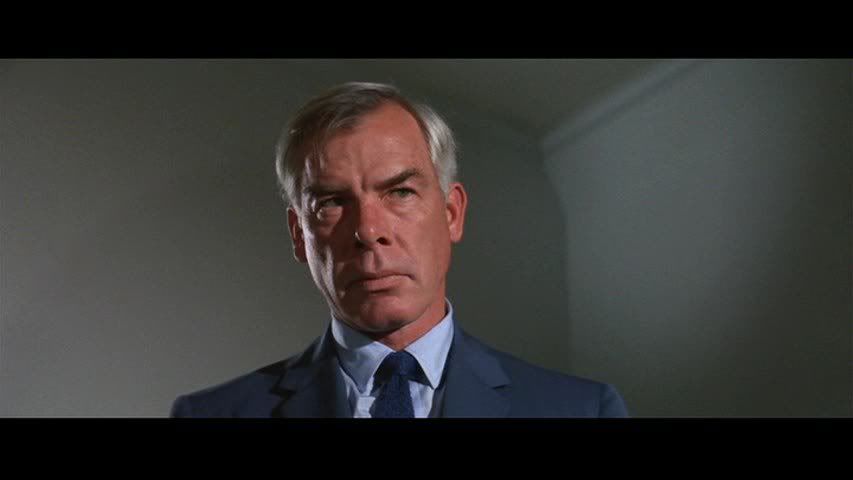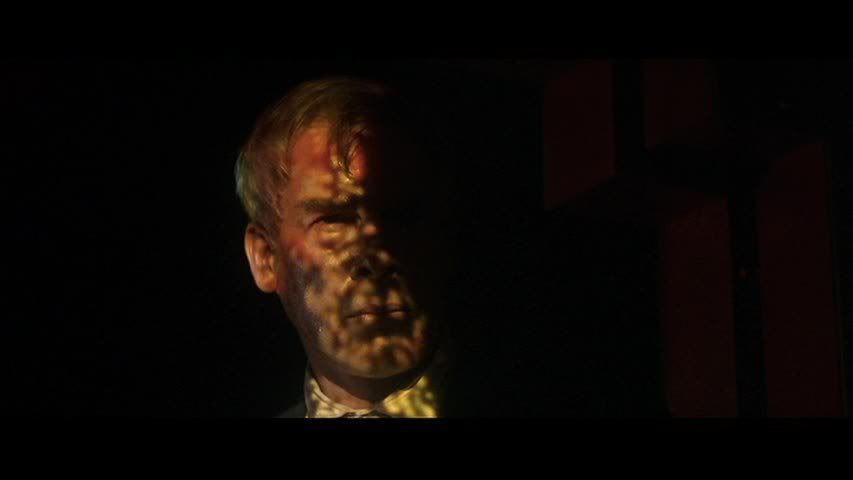
With his snub-nosed mug, intense squint and purposeful stride, Lee Marvin is an archetypal screen tough guy, an image of brutality and stoicism carved in unflinching stone. In John Boorman's pulpy neo-noir Point Blank Marvin plays Walker, a mystery man whose first name is never revealed — always a sign of a true movie badass, for some reason. Walker is betrayed by his wife Lynne (Sharon Acker) and his best friend Mal (John Vernon) when the three hold up a money drop from a big crime syndicate. Mal and Lynne take the money, including Walker's share, leaving him for dead, but apparently not dead enough. Walker, of course, spends the rest of the movie single-mindedly pursuing Mal and the crime bosses above him. It's not about revenge, exactly, since Walker doesn't stop after he's offed Mal, and it's not even about the money, even though every time Walker's asked what he's after he simply repeats "my ninety-three thousand" as though he's a robot with a voice loop. It seems more like Walker, having lost his wife and best friend and any semblance of a life, just has nothing better to do than stomp through the defenses of mobsters and crooked businessmen, pounding on their bodyguards and gruffly demanding payment.
This is, then, the story of a man completely divorced from the world and from ordinary morality, a man consumed by a purposeless quest whose only real goal is to give him an endless supply of targets, of people to hurt. Boorman brings to this bleak, violent tale a cool, distant style deeply influenced by the hip gangster fetishism of the French New Wave, and especially the early 60s films of Jean-Luc Godard. In a perfect demonstration of the circularity of influence, Boorman imports back into the US the kind of stripped-down, alienated gangster thug who Godard had adopted from his own influences in American genre films of the 40s and 50s. Marvin's Walker is the noir hero twice removed, which perhaps explains his generic qualities, his ironic distance. He's certainly not Bogart, but nor is he Belmondo, aping the affectations of Bogart: he's something much simpler, a copy of a copy who retains only the crudest, most essential features of the original, with none of the nuance or sensitivity. He's a tough guy, but not a man of honor, a scrappy fighter not above kicking an opponent in the balls or slapping around a woman. Walker's hardly a hero, stoically and expressionlessly killing his way through the line of men separating him from a payoff that wasn't even his to begin with; he feels he deserves it by virtue of the fact that he stole it.
The only indication that Walker feels anything besides this blinkered obsession with the money that's owed him is, not in Marvin's stony mug, but in the poetic editing and sound design that allow past and present to flow into one another. Boorman switches fluidly between perspectives, cutting together scenes from Walker's initial betrayal, his later encounter with his wife, and various other incidents. This editing is often gestural: a stylized movement, the sweep of an arm or the act of peering through a curtain, will activate an associative cut to a similar movement in some other time and place. Thus Boorman's editing allows, especially, for a continuity between the dead Lynne and her sister, Chris (Angie Dickinson), who helps Walker with his mission by offering herself up to Mal, distracting him at a crucial moment. At one point, during a love scene, Boorman cuts between virtually every possible variation on the couples involved: it's Chris and Walker in bed together, but as they roll over they become Chris and Mal, Lynne and Mal, Lynne and Walker, suggesting that for Walker he and his traitorous friend are interchangeable, and all women are the same.

This would be a blunt, ugly film — and it often is anyway — if not for the cool, detached humor that Boorman brings to it. Sneaking up into Mal's apartment, Walker takes an elevator while the bodyguards are distracted by a ruckus across the street; the elevator door opens behind the guards, revealing a patient, stoic Walker, calmly waiting for the door to close again. Walker's break-in is also assisted by a pair of gay guys in an apartment across the street, who are all too eager to tie themselves up and please their captor. There's a sly, deadpan humor in all of this, a sense that Boorman is subtly undermining his merciless and seemingly unstoppable hitman. This is never more obvious than in the over-the-top scene where an overwrought Chris beats frantically on the unmoving Walker, then proceeds to run around the house turning on all the appliances and the stereo, her mocking voice coming to him over an intercom. She calls him pathetic, sad and misguided, a relic who should just lay down and die, and hearing her detached voice floating through the house, it's hard not to see her words as the director's own perspective, his condemnation of his creation.
Still, Point Blank is basically all about its gangster chic cool, the icy nihilism of Marvin's single-named killer with his silver hair and quiet determination. This killer is the essence of the film, so much so that at the end he doesn't burn out in the expected hail of bullets, nor does he get what he has been ostensibly fighting for all along; instead, he simply melts away into the shadows, as though diffusing, spreading his spirit everywhere. He's thus as present in the final silent shots of Alcatraz island as he is in the many widescreen closeups where his harsh features float in a field of blank nothingness.

5 comments:
"In a perfect demonstration of the circularity of influence, Boorman imports back into the US the kind of stripped-down, alienated gangster thug who Godard had adopted from his own influences in American genre films of the 40s and 50s. Marvin's Walker is the noir hero twice removed, which perhaps explains his generic qualities, his ironic distance...The only indication that Walker feels anything besides this blinkered obsession with the money that's owed him is, not in Marvin's stony mug, but in the poetic editing and sound design that allow past and present to flow into one another."
Great summation of the film in relation to its antecedents.
The second thought that I quoted also highlight its influence on later films, particularly Soderbergh's beautiful "The Limey."
I hadn't thought of a connection between Point Blank and The Limey, the latter being about revenge rather than money, until Tony mentioned it, but it makes perfect sense now. Credit is due to Carroll O'Connor and Keenan Wynn in particular among the strong supporting cast of Boorman's film.
Westlake's work has always had trouble getting adapted for the big screen, especially the Parker series. For every work like Point Blank there are scores of Paybacks (the original cut, not the sublimely entertaining and significantly altered director's version) and What's the Worst That Could Happens. Boorman's adaptation remains the most unflinching, and I think that makes it the truest to the source material. I think you nail exactly what the film is about with: "Point Blank is basically all about its gangster chic cool, the icy nihilism of Marvin's single-named killer with his silver hair and quiet determination."
Great movie, great review.
Great write-up! I couldn't agree more. I'd rank POINT BLANK up there with THE KILLERS as my fave Lee Marvin performances. He's so good at playing a no-nonsense bad-ass.
Thanks for the comments, all. Tony, good point on Soderbergh's The Limey, a fine film which obviously owes a great debt to Boorman and Marvin. Don Siegel's version of The Killers is indeed another great Marvin performance, with a similar intensity and grinding narrative pace. Marvin seems particularly good at playing men defined by pointless obsession.
As it happens, I just noticed a recent conversation on the a_film_by Yahoo group about Donald Westlake and Point Blank. A quote by the poster jeandodge67 leapt out at me as an interesting take on this film, one I hadn't thought of: "Point Blank is clearly a 'ghost story' ... In the Boorman film, Walker never kills anyone - he just appears and intimidates, etc and people die on their own hook."
Post a Comment